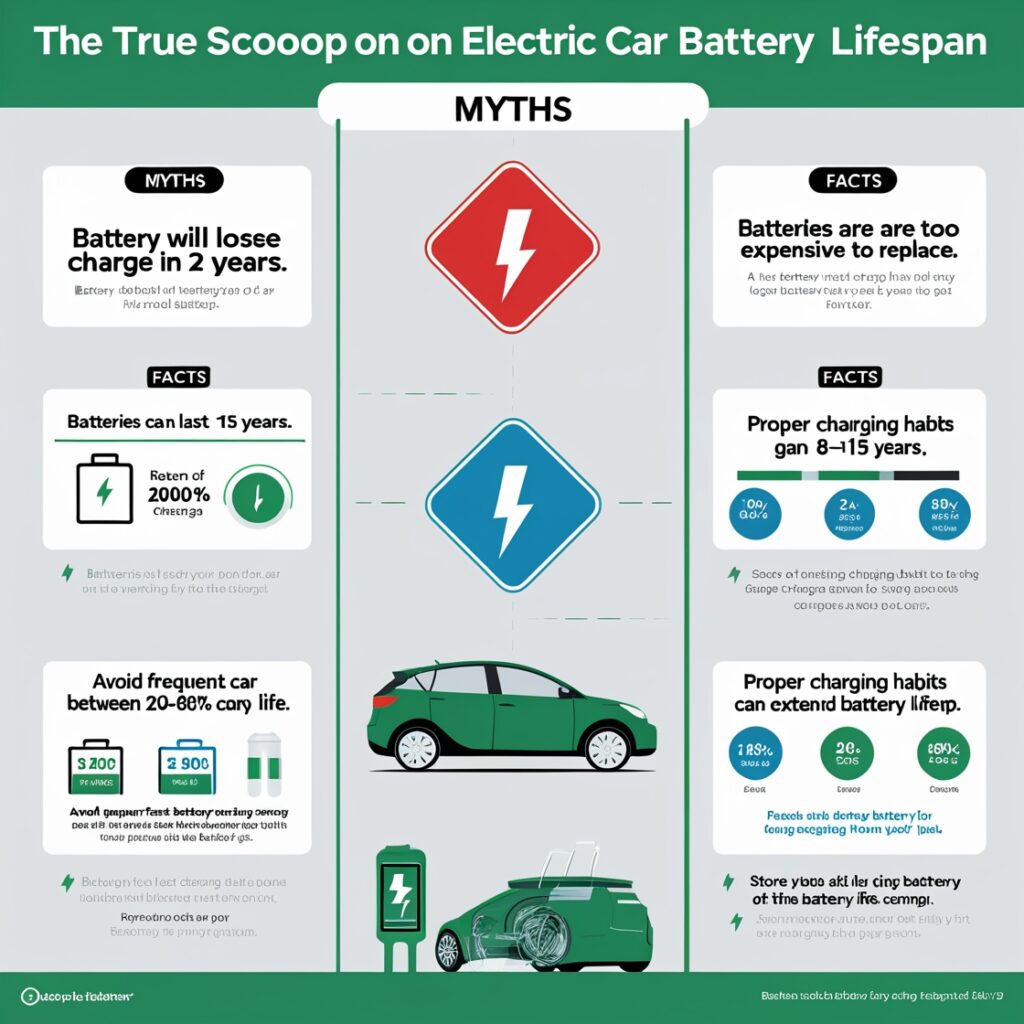Introduction: What They Don’t Tell You About EV Batteries

When we’re talking electric vehicles (EVs), everyone talks about instant torque, silent-as-the-swing-of-a-whisper driving, and emissions-free driving. But come on—what most would-be buyers really want to know is: How long the battery will last?
If you’re considering an electric car or already own one, the phrase “electric car battery lifespan” has likely popped up in your research. Some skeptics claim EV batteries die within a few years. Others promise they’ll outlive the car itself. The truth? Somewhere in between.
Let’s dive into the science, the real numbers in the world, and industry tricks manufacturers won’t always reveal to you. Most importantly, we’ll unveil tested techniques to extend your battery life, saving you thousands in the future.
Comprehending an electric car Battery Lifespan
How Long Do EV Batteries Truly Last?
Unlike your smartphone battery that might not retain a charge so well after two years, electric car battery lifespan are built to last. Studies show that the average EV battery can retain 70-80% of its original capacity at 8-10 years or 150,000–200,000 miles.
For example:
- Tesla Model S: Reports show batteries retaining over 90% capacity after 200,000 miles.
- Nissan Leaf: Older models lost 20-30% capacity in 8 years, but new models have improved longevity.
- Hyundai Kona Electric: Can easily last over 150,000 miles before degradation is serious.
Why? EV manufacturers use advanced thermal management systems to keep batteries at optimal temperatures, unlike smartphones, which overheat rapidly.
The Science Behind Battery Degradation
EV batteries, as all lithium-ion batteries, age due to:
- Charge Cycles: Each full charge and discharge reduces battery health slightly.
- Extreme Temperatures: Heat accelerates chemical breakdown; cold decelerates reaction.
- High Charging Speeds: Fast charging creates heat, which can shorten lifespan.
- Deep Discharges: Draining your battery to 0% repeatedly stresses the cells.
- Time: Even when not in use, lithium-ion batteries degrade over time.
The Biggest Myths Regarding Electric Car Battery Lifespan
The #1 Myth: EV Batteries Must be Replaced Every 5 Years
Fact: EV batteries typically last more than 10 years. In 2023, a Recurrent Auto study found that most EVs lose only 1-2% battery capacity annually under normal use. Car manufacturers even offer 8-10 year warranties, showing they have faith in battery longevity.
Myth #2: Fast Charging Destroys Your electric car Battery lifespan
Fact: Occasional fast charging won’t kill your battery, but frequent ultra-fast charging (350 kW+) will speed up degradation. Tesla, Hyundai, and VW use sophisticated battery cooling systems to reduce this issue.
Myth #3: Electric car Battery lifespan Can’t Be Recycled
Fact: Over 95% of lithium-ion battery content, including lithium, cobalt, and nickel, can be recycled or reused. Redwood Materials and Li-Cycle are at the forefront of EV battery recycling.
Maximizing the Lifespan of Your EV Battery
1. Charge by the 20-80 Rule
Charge between 20% and 80% and avoid full charges (100%) and deep discharges (0%) whenever possible. Studies have indicated that keeping your battery level between 20-80% can extend its life by 50% or more.
2. Charge with Level 2 Chargers More Than with DC Fast Chargers
Fast charging generates excess heat. Where feasible, utilize a Level 2 home charger (7-11 kW) rather than a high-speed DC fast charger (150-350 kW).
3. Chill Your EV Cold
Heat destroys lithium-ion batteries. If you reside in a hot or warm climate:
- Park in the shade or garage.
- Pre-cool your cabin on charge.
- Utilize battery cooling systems (most high-end EVs provide this).
4. Drive Smoothly
Hard acceleration and hard braking increase energy demand, generating heat and shortening the battery’s life. Gentle driving improves efficiency and longevity.
5. Update Your EV’s Software
Many manufacturers, including Tesla and BMW, provide over-the-air updates that optimize battery management and life. Maintaining your EV’s software up to date can improve efficiency and boost battery health.
6. Store Your Car at an Optimal Charge
If you’re leaving your EV parked for weeks or months, store it at 50-60% charge rather than full or empty to prevent deep discharge stress.
Future of EV Batteries: Longer Lifespan, Lower Costs
Battery technology is advancing rapidly. Innovations on the horizon include:
1. Solid-State Batteries
- Expected to last 2-3 times longer than current lithium-ion batteries.
- Faster charging, lower fire risk, and improved energy density.
- Toyota and QuantumScape targeting 2027-2028 release of solid-state EVs.
2. LFP (Lithium Iron Phosphate) Batteries
- Fitted in some Tesla and BYD models.
- Longer cycle life and lower cost than traditional lithium-ion.
- Better suited for repeated fast charging.
3. Battery-as-a-Service (BaaS)
- Exchangable battery instead of ownership.
- NIO and Gogoro already in operation in China.
Conclusion: EV Battery Lifespan Is No Longer a Dealbreaker
If battery life is your biggest fear about going electric, breathe easy. New EVs can easily last a decade or more with barely any loss of range. Follow smart charging habits, keep your battery cool, and drive efficiently—and your EV battery might outlast your car.
Electric car batteries aren’t just built to last; they’re getting better each year. The future of transportation is electric—and you now know how to make your EV’s battery last the distance.
Want to stay up to date on new EV tech? Subscribe to Aatomobil for expert insights on the future of electric mobility!